- Home
- T. Kingfisher
Seventh Bride Page 17
Seventh Bride Read online
Page 17
Well. Well. It was what she had been gnawing over for a week. Hearing the clock-wife confirm it should not have felt so much like a blow to the chest. I suppose…I suppose it could be worse, right? She stifled a hysterical laugh. It was better than what he had done to the golem-wife. Even if Crevan drank down all her years and left her nothing but bones and dust, it was still better than that.
The clock-wife shook her head slowly. “Help,” she said. “My help. I now could. I then would have. I now am not I then. So close to a reliving, this place. To come out of the ice to a wedding.” She narrowed her glass-green eyes. “How do I now know that you do not mean betrayal?”
“You just said he was going to take my youth,” said Rhea. “Isn’t that proof that I’m not on his side?”
“You might be a fool,” said the clock-wife. “There are many and will be many more who serve those who will be harming them.”
“I hope I’m not a fool,” said Rhea, raking her fingers through her hair. She laughed. Except for the bit where you let Maria put you in the clock, without mentioning that she’d done it before. “Or if it’s too late for that, I hope I’m not that kind of fool.”
The clock-wife said nothing.
“Here,” said Rhea, thrusting out her hand. The engagement ring was as cold a grey as the clock-wife’s skin. “There’s the ring. He means to marry me.”
The clock-wife took Rhea’s hand. She was careful this time, holding it very delicately, and yet Rhea could feel the inhuman heat of that grip.
“Yesssss….”
She held out her own hand to Rhea. It took a moment to find grey metal on grey skin, but there it was.
“You, too,” said Rhea.
“I, too. I now, I then. Yessss.”
Rhea rubbed her hands together, feeling her fingertips skid over the ring.
“Give me a death,” said the clock-wife. “Your days for an end to mine. That is what I now ask. That is the price for help.”
A death? Does she want me to kill her? Or—no, if she’s taking my death, does that mean I’ll die? Or that I won’t ever die?
I should probably be really worried about immortality and maybe my soul or something, but I don’t have time for this!
“All right,” said Rhea. “After Crevan’s…dealt with. You can have mine, if another one doesn’t come along.”
“What do you now swear by?” asked the clock-wife, cocking her head. It was a bird-like movement, deeply alien.
“By the Lady of Stones,” said Rhea.
“It is well. It will be well. I now swear by the past uneaten and the Mother Unending. Is it well?”
“It is well.”
“Then let us now go.”
CHAPTER TWENTY-FOUR
The clock-wife looked at her expectantly. Rhea rubbed her sweaty palms on the sides of her dress. “Ah. Yes. Do you know how to get out?”
“If I then knew how to get out, I now would not be here.”
“Um. Just a minute…”
Rhea hurried down the beach to Sylvie, who was gazing over the water with a faint smile on her lips. “Sylvie—”
The pale woman turned. “Oh. Hello. Do I know you?”
I am not going to scream. I’m not. I’ve gotten the clock-wife to agree to help me, I just need to get out. Screaming is not going to get me out.
“No,” said Rhea. “You’ve never met me. Maria told me to find you.”
“Oh! How is Maria? Did she put you in—”
“The clock, yes. Listen very carefully, Sylvie, I need your help.”
Sylvie leaned forward. “Of course. What can I do?”
It’s a good thing you’re basically so nice. This would be really hard if it was Ingeth in here…
“When you left the clock before,” said Rhea. “The part of you that left. Where did it go?”
“Oh,” said Sylvie. “Out through the clock again. I can show you, but it’s closed. Been closed for…oh, a little while, I think. I’m not sure how long it’s been.”
“Can you take me there?”
“Sure,” said Sylvie, and began to pick her way along the curve of the beach, away from the bulk of the glacier.
Rhea hurried after her. The clock-wife followed, taking one stride for every three of Rhea’s.
“My village is this way,” said Sylvie. “Well, it’s sort of my village. There’s nobody there. It’s sad. I don’t go there often, I don’t think—although I was just there, wasn’t I?” She shook herself. “Anyway, there’s a clock in my house. There wasn’t in the real house, so I don’t think it’s quite a real clock, do you?”
“That seems likely,” said Rhea.
“I thought so.”
It did not take very long to reach the village. Rhea wasn’t sure if Sylvie had actually lived in the shadow of the glacier, or if time was just moving strangely because they were inside the clock.
The real Sylvie talked about things melting out of the glacier in summer and coming up at night, so I suppose they could have been close…
As they left the beach behind and struck inland, the stones gave way to earth. Rhea sighed with relief. Her aching feet did better on the even ground than they had on the shifting beach.
The clock-wife appeared to be barefoot. Perhaps when you were not human and not entirely tethered in time, little things like rocks didn’t bother you.
Grass covered the earth, spangled with tiny flowers. There were even a few low bushes and some sort of heather. And then, quite suddenly, they were standing in the middle of the village.
It was an odd little place. They were among the houses before Rhea even realized that the shapes were man-made. The houses were made of some low, shaggy material—sod maybe? Was it sod that made the houses look hairy? The roofs were covered in grass. The doors were made of wood and the few windows were tightly shuttered.
“In here,” said Sylvie, going to one of the houses and pulling open the door. “Watch your step.”
Rhea followed her, stepping down and down again. To her surprise, the house was actually quite large, with a surprisingly high ceiling—it was merely recessed deeply into the earth. Even the clock-wife, coming down the steps, did not need to duck her head.
“Here,” said Sylvie, sounding exasperated. “Foolish thing. And anyway, it doesn’t work.”
Rhea’s eyebrows climbed.
The clock was identical to the one in Crevan’s manor. It stood in the middle of the floor, where it would present the maximum amount of inconvenience to anyone trying to live in the house. Rhea couldn’t imagine any human putting it there. For one thing, the back corner was actually in the fireplace.
Unlike the manor clock, this one’s pendulum hung still and silent. Rhea opened the glass and pushed the pendulum with her finger. It ticked a few times, half-heartedly, then fell silent.
“It is dead,” said the clock-wife. “If it was a passage then, it is not a passage now.”
“I went through it,” said Sylvie. “The rest of me. Except I didn’t.”
“Maria’s supposed to be holding the way open,” muttered Rhea. “Maria?” She leaned into the clock’s mechanism and called the cook’s name, feeling vaguely foolish. “Maria? Are you there?”
There was no answer.
Rhea felt panic starting to rise in her belly and squelched it. Maybe she was called away. Maybe she’ll be back.
Maybe I’m yelling into the wrong clock.
“Are there any other strange clocks around?” she asked.
Sylvie looked puzzled. “Isn’t one enough?”
“Apparently not!” Rhea slapped the case with the flat of her hand. “I can’t go through it!”
“Well, it’s not your clock,” said Sylvie reasonably. “Maybe it was my clock. It’s in my house…”
“You mean there’s a clock at my house?” asked Rhea. “But—is my house even in here?”
“Time is a large country,” observed the clock-wife.
“Great,” muttered Rhea. “So if Sylvie’s house is her
e, then my house should be…what? ….a thousand miles south and a bit east?”
The notion of traveling all that way made her feel physically queasy. I know time isn’t supposed to be passing the same way in here, but surely I’m not meant to walk the length of a continent!
She leaned her forehead on the clock case. The glass was cold against her skin.
Well. Now what?
I could look for another clock in the other houses…or maybe the clock-wife will have some idea, if I can figure out what she’s saying…
Something bumped her foot.
She opened her eyes and looked down, and there was the hedgehog.
“Oh, thank the Lady,” she said, her voice cracking. “I was afraid you’d gotten lost.”
The hedgehog gave her one of its familiar looks.
“I know, I know. I’m loster than you. More lost. You know.” Rhea rubbed her hand over her face.
“A hedgehog!” said Sylvie. “How darling!”
Rhea waited, but apparently the clock-wife had no opinion on hedgehogs at this time.
“Do you know the way out?” asked Rhea, crouching down. “You’re good at that…”
It tapped her shoe and turned away. Rhea rose and followed.
There was a hatch set in the floor of the house. “It’s the root cellar,” said Sylvie. And then, doubtfully, “I don’t think there’s a clock in there…”
The hedgehog poked its snout at the hatch and looked up at Rhea.
“If it says this is the way, then it’s the way,” said Rhea firmly. “I would follow this hedgehog into the mouth of Hell.”
The hedgehog looked pleased by this. Rhea pulled the hatch open—there was an iron ring set in it—and peered down the stairs into the darkness.
“This way?”
A nod. It stepped onto her hand and suffered itself to be placed into its pocket.
Rhea descended the steps.
It was dark and it got darker. The square of light from the hatch was blocked by Sylvie, and then by the clock-wife. By the faint illumination, she found their hands, one soft and cool, one almost scalding.
Hand in hand, the three walked into the darkness.
For the first time since she entered the clock, Rhea felt confident. This was correct. Perhaps she did not need a clock, perhaps all she had needed was darkness.
Perhaps magic had to happen in the dark.
“Maria?” she called. “Maria, can you hear me?”
She could feel her companion’s footsteps through their hands, Sylvie’s careful, the clock-wife’s slow and sure.
The hedgehog shifted in her pocket, leaning left. Rhea took it as a direction and angled that way as well. The light from the hatch vanished behind them.
“I don’t remember the root cellar being this big,” said Sylvie doubtfully. “We should have run into shelves and things.”
“I don’t think we’re in the root cellar,” said Rhea.
The hedgehog leaned again. Rhea shifted to follow.
She did not know how long they walked through the darkness inside the clock. They seemed to be angling downward. I went up a long way on the tile. Maybe I have to go back down…
Finally the hedgehog leaned back. Spines prickled her skin through the pocket, and Rhea stopped.
“Here?” she asked.
A very small shrug in answer. Rhea cleared her throat. “Maria? Maria, can you hear—?”
A door opened and light poured into the darkness. Through it, Rhea could see checkerboard tiles and Maria’s face.
Clutching her companion’s hands, burning herself on the clock-wife’s skin, Rhea fell forward, out of the clock and into Maria’s arms.
CHAPTER TWENTY-FIVE
“I brought her,” she said, hearing her own voice high and babbling in her ears. “I brought her, Maria, she’ll help, she wants a death, that’s all, somebody’s death, I don’t know what it means, I said she could have mine—”
She turned her head, and the clock-wife came stepping out the clock like a woman coming out of water. Her hand in Rhea’s was suddenly fiery and Rhea had to jerk her fingers away.
Maria set Rhea on her feet and bowed deeply to the clock-wife.
“Witch,” said the clock-wife, inclining her head.
“Power,” said Maria.
Rhea looked down at her empty hands, then back at the clock. “Where’s Sylvie?”
Maria did not take her eyes off the clock-wife, but said “She’s in the kitchen, of course.”
“Not that Sylvie!” Rhea put her hands on the clock’s case, but the glass was as cold and solid as ever. “The one in the clock, she was right with us—I thought I brought her out—Maria, she’s been trapped in the clock!”
Maria did look over then. “What?”
“She said you sent her in—she said part of her left, but part of her was still in there—”
For the first time since Rhea had met her, Maria looked suddenly old. Her face went slack and ashy. “In the clock? Part of her is still in the clock?”
She didn’t know, Rhea thought.
It felt wrong to feel such intense relief when Maria looked as if she had been dealt a mortal blow—and yet she did. She didn’t know. She might not have told me that Sylvie had been in the clock, but she didn’t know she was stuck in there.
There was a sound, then, as the front door opened.
“No time,” said Maria, pressing her wrist against her forehead. “No time! Years I’ve waited, and now I am out of time…”
She squared her shoulders. “We’ll set it right after,” she said. “Come on. He has to have felt something happening, unless I miss my guess—”
Rhea looked down at herself, at the red dress which had popped a half-dozen seams, at the lump made by the pocket full of hedgehog. “I can’t—”
“Go,” said Maria, and pushed her toward the door.
She went.
Ingeth was holding the front door open. Her eyes narrowed when she saw Rhea, and she made a sharp, impatient gesture.
But doesn’t she see…?
The clock-wife walked a single pace behind Rhea, moving in her shadow. She should not have been invisible—she was nearly seven feet tall, for the love of the Lady of Stones—and yet Ingeth was looking only at Rhea and did not even seem to notice the figure that walked behind her.
It’s some trick she’s doing. It must be. Or something Maria’s doing. She’s right there—Ingeth should be running—raising the alarm—
Ingeth scowled, but that was all.
Rhea walked through the door and into the courtyard.
The light seemed terribly bright after the washed-out grey of the beach inside the clock. There were perhaps fifteen or twenty people there, standing in awkward little clumps. An enormous crowd to her eyes, which had been looking at the same handful of women day after day for…for however long it had been.
She walked toward them, keeping her pace measured, trying to remember other weddings she had seen. There should be music playing, shouldn’t there? Something to set the tempo? Someone on the flute or the tambour, someone playing pipes or a fiddle…
But there was no music. Perhaps Crevan had not thought so far ahead.
As many times as he’s been married, you’d think he’d be better at it…
Rhea had an urge to stare at her feet. Brides did not stare at their feet, did they? She looked up instead, at the people who had gathered to witness her wedding.
There was the Viscount, who she recognized from the midwinter feast—a big, round-bellied man going grey at the temples. His friend was marrying a peasant under his rule, and so he could hardly fail to appear, but he looked bored, and the people clustered around him looked anxious.
When he saw her, he smiled, and Rhea had time to think, Is he being kind? Does he not see what a wreck my dress is?
She turned her face to the other side of the aisle, and there were her parents.
Her mother clutched her father’s hand and took a half-step forward, b
ut Rhea shook her head minutely. Not now. Wait.
It was hard to walk by them, hard to see them slide out of her line of vision. Soon. Soon it’ll be over. One way or the other.
Lady of Stones, if I’m going to die, please let them not be watching.
And there was the priest, standing under the metal arch. The golem birds had been taken down, Rhea saw.
Well, they were hardly festive.
All of the people looked at her, and none of them looked at the clock-wife.
Except one.
Crevan stood beside the priest, half-turned to watch her as she approached. She saw him blinking, as if there were something in his eyes that he was trying to clear away.
He almost sees her. He knows something’s going on, but he can’t do anything, not with the Viscount right here.
People will forgive you hasty marriages to unworthy peasant girls, but they won’t forgive you making a public scene.
Crevan tried. He took a half-step toward her, one hand going to his head, and his mouth opened and closed, as if he were trying to think of something to say.
She hurried her steps. There was undoubtedly some magic he could do—set the house on fire, summon an earthquake, make the priest fall down in a fit—something that would stop the wedding and leave him looking blameless. She could not give him time to do any of those things.
“Ah—” said the priest, when she was only a few steps away. “Ah, yes.” He swallowed, and Rhea watched his Adam’s apple bob up and down. From somewhere, she felt a brief pang of pity.
You are out of your depth, poor man. And something terrible is about to happen in front of you…
“Wait,” said Crevan, almost soundlessly. She heard him, but she did not think anyone else did. He licked his lips and opened his mouth to try again.
“Well. If we are all here—” began the priest.
“Yes,” said the clock-wife, in a voice like a great bell tolling. “Yes, we are all here.”
A little wave of murmurs went through the crowd and washed around them. Crevan recoiled, raising his hands in front of him. His eyes were wide, the whites shocking against his skin, like a frightened horse rearing.

 Paladin's Strength
Paladin's Strength The Twisted Ones
The Twisted Ones The Hollow Places
The Hollow Places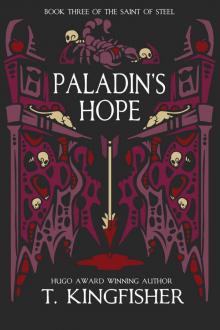 Paladin’s Hope: Book Three of the Saint of Steel
Paladin’s Hope: Book Three of the Saint of Steel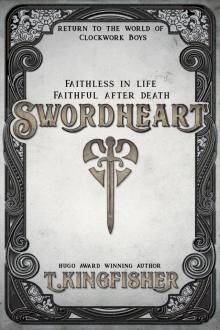 Swordheart
Swordheart Jackalope Wives And Other Stories
Jackalope Wives And Other Stories A Wizard's Guide to Defensive Baking
A Wizard's Guide to Defensive Baking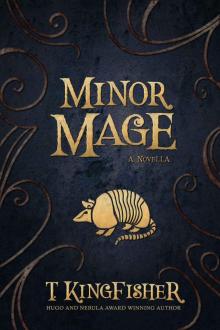 Minor Mage
Minor Mage The Halcyon Fairy Book
The Halcyon Fairy Book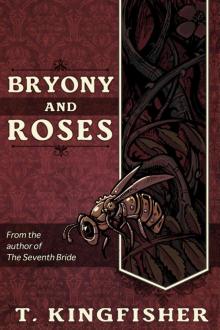 Bryony and Roses
Bryony and Roses The Wonder Engine_Book Two of the Clocktaur War
The Wonder Engine_Book Two of the Clocktaur War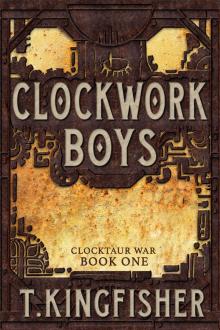 Clockwork Boys: Book One of the Clocktaur War
Clockwork Boys: Book One of the Clocktaur War The Raven and the Reindeer
The Raven and the Reindeer Summer in Orcus
Summer in Orcus The Wonder Engine
The Wonder Engine Seventh Bride
Seventh Bride Toad Words
Toad Words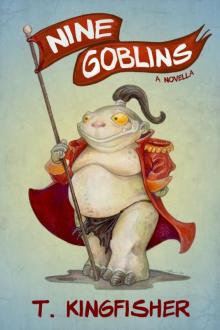 Nine Goblins
Nine Goblins